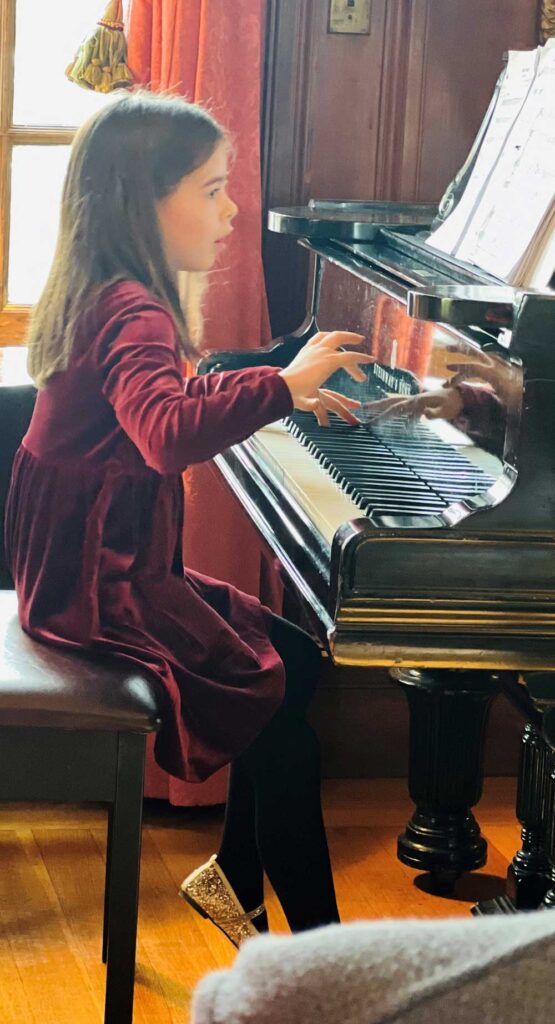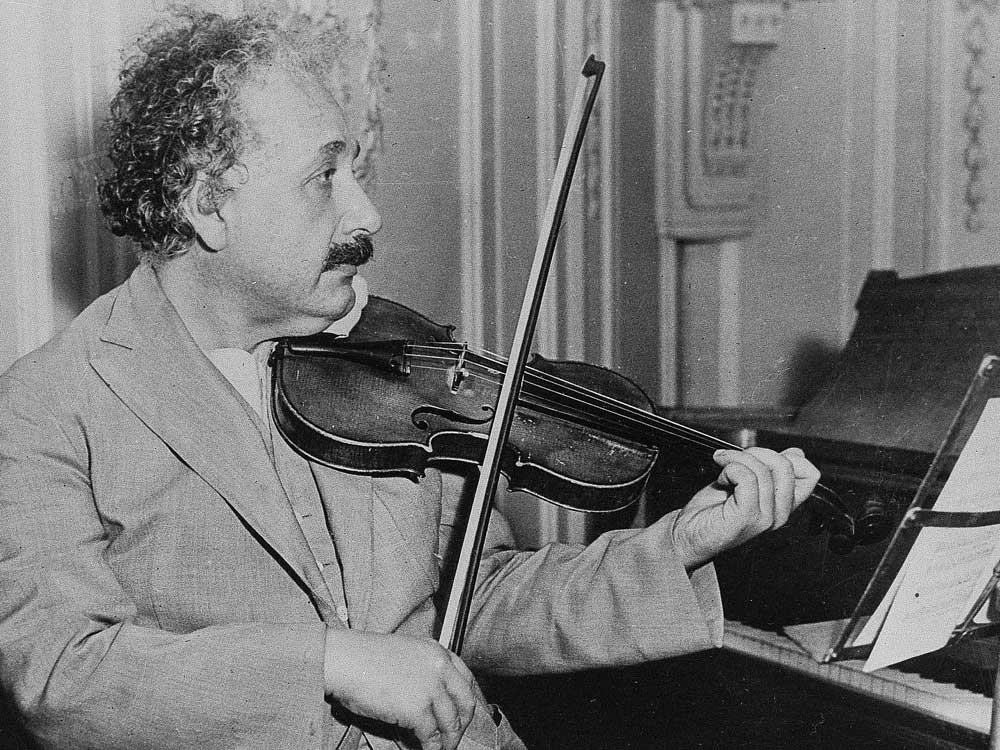Harmonizing Minds: The Cognitive Symphony of Music Lessons for 5-Year-Olds at Music is Chappaqua
In the picturesque town of Chappaqua lies a gem of an opportunity for nurturing young minds: Music in Chappaqua. As parents, we constantly seek avenues to enrich our children’s lives and lay the groundwork for their future success. One such avenue, often overlooked yet profoundly impactful, is the world of music. This blog delves deeper into the benefits of enrolling 5-year-olds in music lessons at Music is Chappaqua. We will even dive into how this early exposure to music creates neuropathways joining the two hemispheres of the brain. This is what scientists proved was behind the great, legendary mind of Albert Einstein.
The Einstein Connection:
What do studying music and Einstein’s brain have in common? In 1955 scientists rushed to study Einstein’s brain with hopes to understand the source of his intelligence. They found the source of his extraordinary intelligence, unconventional thinking, and powerful imagination was in the highly developed connection between his two brain hemispheres. Einstein deepened his problem solving power by processing information on both sides of the brain: analytically with the left brain and imaginatively with the right. Now, it’s widely believed that it was his ability to transverse single hemisphere processing that set him apart. Music is one of the few activities that stimulates both hemispheres of the brain simultaneously. Learning an instrument requires memorization of key terms and symbols and the structural analysis of a composition. This employs the left side of the brain which processes information sequentially. Music also requires non-linear thinking, such as the ability to synthesize different aspects of a process or task. The right side of the brain allows one to simultaneously read pitch, rhythm, tempo, dynamics, key signatures, and time signatures. Any subject in school, any extracurricular skill, and any profession later in life can benefit enormously from the highly transferrable skills learned in music. At Music in Chappaqua, we apply imagination, intellectual curiosity, and openness to experience some of these traits now attributed to Einstein’s genius.
1. Cognitive Development:
The age of 5 marks a critical period in a child’s cognitive development, characterized by heightened neuroplasticity and rapid neural growth. Music lessons during this formative stage stimulate various brain regions, including the auditory, motor, and prefrontal cortex, leading to enhanced cognitive functions such as memory, attention, and problem-solving skills. The intricate patterns and structures inherent in music challenge the brain in novel ways, promoting neural connectivity and cognitive flexibility.
Furthermore, playing an instrument or singing requires focused attention, active listening, and processing and interpreting complex auditory information in real-time. These cognitive demands foster mental agility and sharpen cognitive skills that extend far beyond the realm of music, proving valuable in academic pursuits and everyday life.
2. Emotional Intelligence:
Music is a universal language that transcends cultural boundaries and communicates emotions with unparalleled depth and nuance. Children learn to express themselves creatively and interpret the feelings conveyed through melody, harmony, and rhythm by engaging in music lessons at Music is Chappaqua. Whether it’s the triumphant crescendo of a symphony or the melancholy strains of a ballad, music serves as a conduit for emotional expression and exploration.
Moreover, participating in ensemble performances or group rehearsals fosters a sense of camaraderie and collaboration as children learn to listen to each other, coordinate their efforts, and work towards a common goal. These social interactions cultivate empathy, cooperation, and interpersonal skills, nurturing emotionally intelligent individuals capable of navigating the complexities of human relationships with grace and compassion.
3. Fine Motor Skills and Coordination:
Playing a musical instrument demands precision, control, and coordination of fine motor movements. Not only are the two hands engaged in different activities simultaneously, the eyes are reading off the page while listening to the sounds of the room and sensing what’s coming next. Mastering an instrument requires the refinement of fine motor skills and the development of hand-eye coordination.
At Music in Chappaqua, skilled instructors guide young learners through progressive exercises and techniques designed to strengthen their motor skills and enhance their talent. Through consistent practice and repetition, children gradually master their instruments, laying the foundation for future proficiency and musical expression.
4. Language Skills:
The intricate interplay between melody, rhythm, and lyrics in music mirrors the structural complexity of language, making it an ideal tool for language acquisition and development. Children enhance their auditory discrimination, phonological awareness, and linguistic comprehension by engaging in musical activities and improving vocabulary, syntax, and reading fluency.
Moreover, the rhythmic patterns and tonal variations inherent in music stimulate auditory processing centers in the brain, facilitating the encoding and retrieval of linguistic information. As children learn to decode musical notation and interpret musical symbols, they hone their cognitive abilities and strengthen the neural circuits involved in language processing, laying a solid foundation for linguistic academic success and lifelong learning.
5. Social Skills and Teamwork:
Music is often a collaborative endeavor, requiring individuals to work together harmoniously towards a shared musical goal. Whether performing in an ensemble, rehearsing with a band, or singing in a choir, group music lessons provide ample opportunities for children to develop essential social skills and teamwork abilities.
At Music in Chappaqua, children learn to listen attentively, communicate effectively, and collaborate with their peers to create cohesive musical performances. Through shared experiences and collective problem-solving, they cultivate a sense of belonging, mutual respect, and responsibility, fostering a supportive learning environment where every voice is valued and celebrated.
6. Confidence and Discipline:
Mastering a musical instrument or perfecting a vocal technique requires dedication, perseverance, and a growth mindset. By embarking on the music education journey at Music is Chappaqua, children learn to set goals, overcome challenges, and celebrate their achievements with confidence and resilience.
As they progress through their music lessons, they experience the satisfaction of incremental improvement and the joy of self-expression, fueling their intrinsic motivation and passion for music. Moreover, the discipline and time management skills cultivated through regular practice sessions instill a sense of responsibility and accountability, empowering children to take ownership of their learning and pursue their passions with dedication and purpose.

Conclusion:
In the vibrant community of Chappaqua, Music is Chappaqua stands as a beacon of musical excellence and educational enrichment, offering young learners the opportunity to embark on a transformative journey of self-discovery and growth. Enrolling your 5-year-old in music lessons gives them a gateway to cognitive development, emotional intelligence, fine and gross motor skills, language proficiency, social aptitude, and a strong sense of confidence and discipline.
In the footsteps of Einstein, let your child’s brain resonate with the harmonious symphony of music, where the creative and logical dimensions of their minds converge in perfect harmony. Music is not merely an extracurricular activity; it is a profound form of human expression that nourishes the soul, enriches the mind, and empowers individuals to reach their full potential. Embrace the transformative power of music education and embark on a journey of discovery and growth that will shape your child’s future for years to come.
Educating musical minds since 1993 • Performance •Self-Expression

Founder & CEO
Music in Chappaqua
C: 914-220-2924
O: 914–238–3123
musicinchappaqua.com
mail@musicinchappaqua.com


